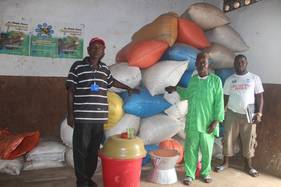Ebola recovery support boosts farmers in Sierra Leone

The outbreak of the Ebola Virus Disease has a multi-sectoral adverse impact in Sierra Leone, including on agriculture, which is one of the major income generating sector in the country.
The outbreak caused the disruption of farming activities, the closure of periodic markets, price volatility, and the depletion of revolving funds of individual farmers and groups.
In the framework of its support to the government of Sierra Leone, FAO received timely financing from the Africa Solidarity Trust Fund (ASTF) to mitigate the negative effects of the outbreak on farmers' livelihoods.
Together with the Ministry of Agriculture, Forestry and Food Security (MAFFS), FAO is supporting sixteen Agriculture Business Centres (ABCs), comprising 3 000 farming households that benefitted from cash transfers based on actual needs. This support has enabled farmers to reactivate their village savings and revolving funds, increase their productivity, purchase desired agricultural inputs and invest in their productive capital.
During an FAO four-day tour in farming communities in the East, North and South of the country, beneficiaries of the Ebola recovery support gave testimonies of how the support have capacitated them to recover from the devastating effects of the outbreak.
The Tawopanneh Agriculture Business Centre (ABC) located in Kamaranka Town in Bombali District, benefitted from USD 7500 based on their recovery need. The ABC comprises two farmer-based organizations (FBOs) with 100 members engaged in rice and groundnut farming. Its main source of income is the buying and selling of agricultural inputs to individual farmers and organizations in the district.
According to the Chairlady, Salamatu Bangura, members of the Centre were preparing for harvest when the disease breakout in their community. In 2015they didn't harvest the forty-five acres of groundnut and inland valley swamp rice fields because of panic, quarantine measures and movement restrictions. "The poor yield and market disruption prevented the Centre from meeting the demands of its customers" she lamented.
With the ASTF support, the Centre is now capacitated to buy farming inputs and agricultural products again, and at higher levels than during the previous years when businesses were normal. At the time of the FAO visit, the Centre had established a seed bank including groundnut seeds, and stocks of rice and beans were in place. Fertilizers and other agricultural inputs were being purchased in the capital Freetown.
"We received the support at the time we needed it most because we were very worried that we could not meet the demand of our customers for this year. The fact that our revolving capital had been depleted because of market disruption was our major source of concern" she said.
The management of the Centre is expected to get more agricultural inputs against February 2016 as they have dished out cash to agents in the surrounding villages to buy on their behalf.
Like the members of the Tawopanneh ABC, other beneficiaries of FAO cash transfers have used them to reactivate their village savings and revolving funds, increase productivity, procure desired agricultural inputs and increase investments.
It is expected that this assistance will have a multiplier effect on their communities as cash injected will boost economic activities and bring income to their homes.
Published: May, 2016
Project: Post-Ebola Agribusiness Sector Recovery in Sierra Leone
